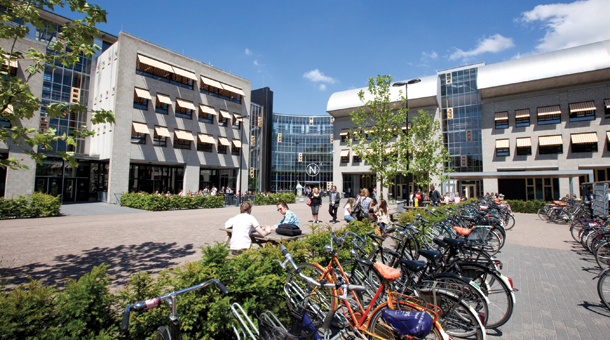Get Into Games 2015: NHTV

Dr Mata Haggis joined NHTV as a senior lecturer in 2010, and has 15 years’ experience in the digital entertainment industry – seven of which were spent running his own game company. At the moment, he’s collaborating with the NHTV alumni-founded SassyBot Studio on a narrative-focused project called Fragments Of Him. In his new role as professor of creative and entertainment games, Haggis will continue his own research and to strengthen NHTV’s reputation. Here, he tells us how the school’s focus on the industry keeps it relevant.
Tell us about your courses.
International Games Architecture And Design (IGAD) is a four-year Bachelor Of Science course designed to bring beginner game developers up to a young professional standard or above, with the opportunity to work on great portfolio pieces and live projects in professional development studios. Students choose to begin with a focus on 3D visual art, programming, or design and production, and in later years they can mix these areas for a broad skillset. They might choose to add game audio, or to narrow down to a single, specialist development role. The Master Of Game Technology (MGT) is a one-year Master that builds on the practical skills of a Bachelor student, but takes these to higher level with increased flexibility in their project work, and a variety of structured lectures… You can define your own project from the beginning, then refine and research it with the support of our staff and feedback from visiting professionals.
How should prospective students decide between the two?
Where the Bachelor course gives you the ‘how’ of game development, the Master helps you find the deeper ‘why’ behind industry processes. By learning about these core structures of game tech, you become adept in advanced industry-relevant skills, which makes you a desirable employee capable of advancing to senior development duties.
What value do you think a game education has in today’s industry?
In the most basic sense, the industry has become incredibly competitive. More and more people are joining, so the entry-level skills bar has been raised. A good education allows you the time to create a great portfolio and to walk into a studio with the skills they need. In addition, with the right education, you can build industry networks far faster than a junior development job will typically allow. On a more abstract level, our focus is on creating amazing, intelligent game developers and supporting their dream projects. Our only goal is the growth of students in both their technical knowledge and soft skills, such as teamwork and leadership, and we don’t have publisher deadlines to interfere with this.
What makes NHTV stand apart?
Both students wishing to join a triple-A studio and those who have a goal of starting their own business benefit from our courses’ unusually high level of industry focus. This difference from other academies is most noticeable in our staff: 100 per cent of the lecturers come from a development background across a wide variety of genres, platforms, and business models, and so have hands-on knowledge to share with students, as well as professional networks to use to get industry feedback.
Sign up to the GamesRadar+ Newsletter
Weekly digests, tales from the communities you love, and more
Edge magazine was launched in 1993 with a mission to dig deep into the inner workings of the international videogame industry, quickly building a reputation for next-level analysis, features, interviews and reviews that holds fast nearly 30 years on.



